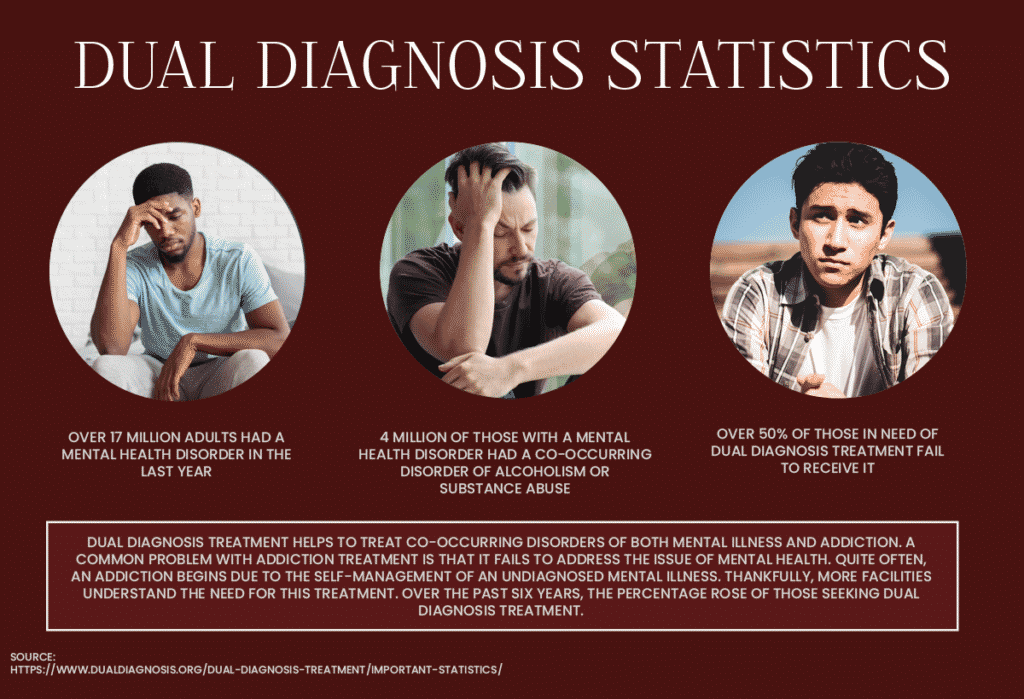Dual Diagnosis Treatment & Therapy
Battling any sort of health problem, whether it be a substance abuse or a mental health disorder, is not an easy thing to do. In some cases, these battles are life-long, and can be fatal if not treated with the proper medical help. Alone, these health problems are dangerous enough, however there are those who find themselves branded as dual diagnosed. What does dual diagnosis mean? According to Medicine Plus, “a person with a dual diagnosis typically has both a mental disorder and an co-occurring alcohol or drug abuse disorder. These conditions occur together frequently. About half of people who have a mental disorder will also have a substance use disorder at some point in their lives and vice versa.
The interactions of the two conditions can worsen both.” (1) People who suffer from dual diagnosis have a rougher road to ride compared to those with only a substance abuse problem or mental health disorder. In a “normal” case, someone suffering from drug addiction will seek out a rehab center, detox facility, or support-group. Someone with a mental health disorder would seek out therapy, a psychologist, or specific counseling. But is there dual diagnosis treatment? What about dual diagnosis therapy? What does dual diagnosis mean to someone who suffers from pre-existing conditions?

What does Dual Diagnosis mean?
We already answered the question “What does dual diagnosis mean?” but technically, dual diagnosis doesn’t just mean battling from substance addiction and a mental health disorder simultaneously. Ph.D.’s Robert Drake and Michael A. Wallace write, “In many ways dual diagnosis is an unfortunate misnomer. There are other dual diagnosis populations, such as those with mental illness and developmental disabilities. Persons with severe mental illness and substance use disorders can be described in other ways and at other levels: they have multiple interacting disabilities, psychosocial problems, and disadvantages. The population of persons with co-occurring mental illness and substance use disorders is itself quite heterogeneous.
It includes individuals with less disabling mental illnesses such as anxiety disorders, those with different severe illnesses such as schizophrenia and bipolar disorder, and those with either substance abuse or substance dependence.” (2) So what does dual diagnosis mean in the context of drug addiction and mental health disorders? Dual diagnosis means you have been diagnosed by mental health professionals with both a mental health disorder and a severe substance abuse problem. By 1989, the term dual diagnosis began to appear in medical publications and was commonly used when referring to people suffering from both mental health diseases and substance abuse problems.
Check Your Insurance Coverage for FREE
Find out if your insurance covers addiction treatment in minutes. We accept most insurance!
Mental Health Disorders & Substance Abuse
Substance abuse and mental health disorders go hand in hand, but it’s hard to tell what comes first, or what causes the other. Sometimes, people who are predisposed to mental health disorders and were diagnosed in their early years might’ve suffered a tough childhood, leading them to find solace in substances. In other cases, some people are more prone to substance addiction because their parents were substance abusers, either actively during the time of pregnancy, before pregnancy, or after. Regardless, a child who has an alcoholic or drug-addicted parent is more likely to develop a substance abuse disorder themself.

Addiction has many different side effects, one of which being the deterioration of one’s mental health. Sometimes, people experience psychosis, which is a state of losing contact with reality, including hearing and or seeing things that are not there. Falling in and out of psychosis and long-term drug addiction can lead to the development of a permanent mental disorder. People who have either of these disorders may seek therapy or support-groups, but is there specific dual diagnosis treatment, and is dual diagnosis therapy different from regular therapy?
Dual Diagnosis Treatment
Dual diagnosis treatment comes in many different forms. According to Dualdiagnosis.org, “dual diagnosis treatmentis a method of treatment in which a person is diagnosed with both a substance use disorder (such as alcohol use disorder) and a mental health disorder (such as depressive disorders, bipolar disorders, anxiety attacks, etc.). An interaction between the two conditions will make rehabilitation more complex, resulting in a less desirable care outlook and a higher risk of adverse health effects if not treated properly. A relatively innovative addiction recovery center can simultaneously seek assistance for mental illness issues.” (3) Although you can receive regular substance abuse treatment, dual diagnosis treatment is a bit different. It’s important to note that over 50% of those in need of dual diagnosis treatment fail to receive it. (4) Dual diagnosis treatment centers use specific types of dual diagnosis therapy to help their patients.
Usually, a dual diagnosis treatment center will try to fine-tune their treatment to each patient, but in general, dual diagnosis therapy will include cognitive behavioral therapies and various trauma therapies. They also implement group dual diagnosis therapy, which offers patients unity, support, and advice during their recovery process. There are specific instances and feelings that only someone with dual diagnosis can understand, so group dual diagnosis therapy can be a great place to find community. These specific therapies, combined with family dual diagnosis therapy that helps patients receive support after their treatment is complete, will hopefully keep someone with dual diagnosis sober for a lifetime. Many people who suffer from both substance abuse and mental health problems try to get along on their own. They will ignore one of their problems and seek out traditional routes like rehabs or group meetings, while neglecting their mental health. Even though regular treatment centers are good for battling drug addiction or alcoholism, some are not equipped to treat mental health disorders.
Similarly, therapists and psychologists have great insights, tools, and resources to offer those with trauma, and a psychiatrist can properly prescribe medication to help with mental illnesses as needed. However, without physical sobriety, one might be tempted to abuse the medication they are prescribed for their mental health problems, essentially canceling out the work a therapist or psychologist is doing. Therefore, it’s important that people diagnosed with both substance abuse disorder and mental health problems receive specific types of dual diagnosis treatment, utilizing a treatment team that can help them soberly address their issues from all angles.
Reach out to Hotel California by the Sea
We specialize in treating addiction and other co-occurring disorders, such as PTSD. Our Admissions specialists are available to walk you through the best options for treating your addiction.
References:
